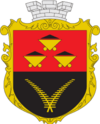Krystynopol
| Chervonohrad | |||
|---|---|---|---|
| City of regional significance | |||
| Червоноград | |||
|
|||
| Location of Chervonohrad in Ukraine | |||
| Coordinates: 50°23′N 24°14′E / 50.39°N 24.23°ECoordinates: 50°23′N 24°14′E / 50.39°N 24.23°E | |||
| Country |
|
||
| Oblast |
|
||
| Municipality | Chervonohrad | ||
| Founded | 1692 | ||
| Government | |||
| • Mayor | Serhiy Chudovskiy | ||
| Area | |||
| • Total | 37.6 km2 (14.5 sq mi) | ||
| Elevation | 150 m (490 ft) | ||
| Population (2016) | |||
| • Total | 67,492 | ||
| Time zone | EET (UTC+2) | ||
| • Summer (DST) | EEST (UTC+3) | ||
| Sister cities | Békéscsaba | ||
Chervonohrad (Ukrainian: Червоноград, Polish: Czerwonogród) is a mining city located in the Lviv Oblast of western Ukraine. Chervonohrad is designated as a city of oblast significance. It about 62 km north of Lviv, 7 km from Sokal, and 28 km northeast of the town of Voroniv. Population: 67,492 (2016 est.).
Prior to 1 November 1951, the city was known as Krystynopil (Ukrainian: Кристинопіль, translit. Krystynopil'). The German name for it was Krisnipolye. The city is known for mining that started in the 1950s. It passed from Poland to the USSR after the territory exchange in 1951. Local Ukrainians also frequently refer to the city as "Krasnohrad," literally meaning red city in the Russian language.
The municipality of Chervonohrad also includes the town of Sosnivka and the urban type settlement of Hirnyk.
In May 1685 the royal hetman, Kraków Voivode , bought himself a new piece of land on the Bug River. In 1692, he founded a city on the lands of the village "Novyi Dvir" (literally "New Garden", Polish: Nowy Dwór), which he named after his wife Krystyna Lubomirski (1661–1699). Potocki made Krystonopil' his family center. He died here on September 22, 1702. His grandson built a palace and in 1763 founded a monastery of Basilians (barocco church of Saint George; prior to 1946 р. - miracle place with wonder icon of the Mother of God).
...
Wikipedia



